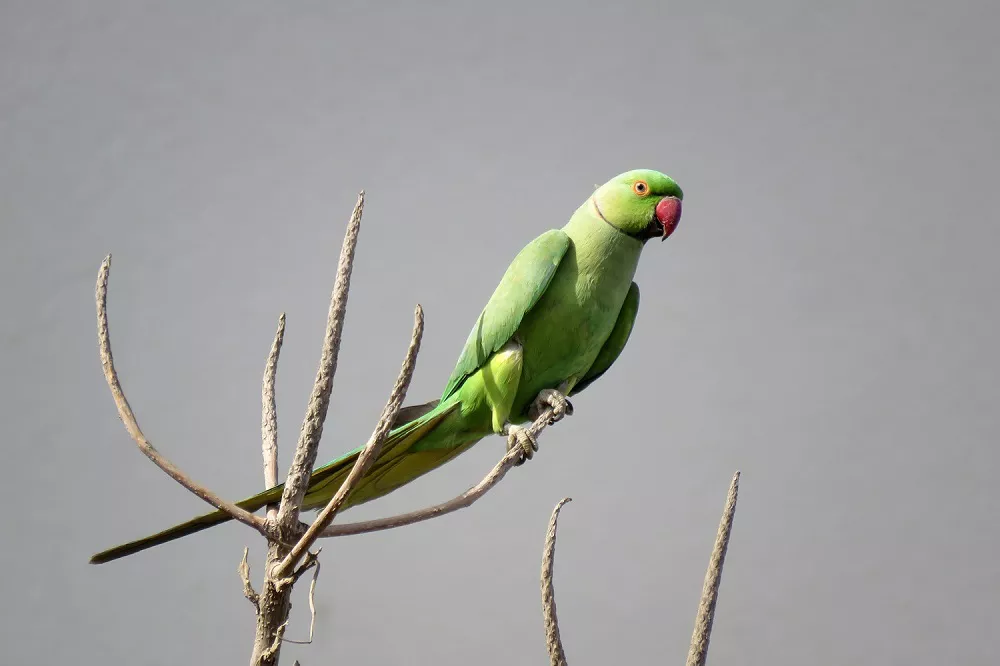Indian Ringneck parrots are known to be excellent pets due to their striking colors and intelligent nature. They require a well-balanced diet to stay healthy and happy. In this article, we will discuss the different types of fruits that Indian Ringnecks can eat and their nutritional benefits.
Fruits are an essential part of a parrot’s diet. They provide essential vitamins and minerals necessary for their growth and development. Here are some fruits that are safe and healthy for Indian Ringnecks:
1. Apples:
Apples are a fantastic fruit option for Indian Ringneck parrots. They contain essential vitamins like vitamin C, which helps boost the immune system, and dietary fibers that promote digestive health. You can give your Indian Ringneck parrot apple slices or small chunks as part of their daily diet. Be sure to wash the apples thoroughly before feeding them to your bird.
2. Bananas:
Bananas are another excellent fruit choice for Indian Ringneck parrots. They are rich in potassium, an important mineral that promotes muscle and heart health. Bananas are also high in fiber, which aids digestion. Your bird will enjoy eating small pieces of banana as a treat or as part of their regular diet.
3. Grapes:
Grapes, both red and green varieties, are safe for Indian Ringneck Parrots to consume. These bite-sized fruits are rich in antioxidants, vitamins, and minerals. However, be mindful of the seedless nature of the grapes, as seeds can pose a choking hazard. It is advisable to cut them into smaller portions before offering them to your feathered companion.
4. Mangoes:
Mangoes are a tropical fruit that Indian Ringneck parrots love to eat. They are an excellent source of vitamin A, which promotes healthy eyesight and skin health. Mangoes also contain dietary fiber, vitamin C, and folate, making them a nutritious addition to your bird’s diet. Remove the skin and pit before serving bite-sized portions to your parrot.
5. Papayas:
Papayas are another tropical fruit that Indian Ringneck parrots can safely consume. They are rich in enzymes that aid digestion and promote gut health. Papayas are also high in fiber, vitamin C, and beta-carotene, a precursor to vitamin A. Remove the seeds and skin before offering small chunks to your bird.
6. Pomegranates:
Pomegranates are highly nutritious fruits that provide a plethora of health benefits for Indian Ringneck Parrots. Packed with antioxidants, vitamin C, and fiber, pomegranates can boost their immune system and promote overall well-being. Offer bite-sized pieces of the fruit, ensuring there are no seeds or the white pith, which can be bitter.
7. Melons:
Melons such as cantaloupes, honeydews, and watermelons are all safe for Indian Ringneck parrots to consume. These fruits are high in water content, promoting hydration in your bird. They are also rich in vitamins A and C, which support immune function and overall health.
8. Berries:
Indian Ringneck Parrots can enjoy a variety of berries, including strawberries, blueberries, and raspberries. These small fruits are packed with vitamins, minerals, and antioxidants, which support their immune system and promote healthy feather growth, making them a healthy addition to your bird’s diet. Ensure that the berries are washed thoroughly and cut into appropriate sizes before serving.
Incorporating Fruits into Your Indian Ringneck Parrot’s Diet
When introducing fruits into your Indian Ringneck parrot’s diet, start with small amounts and monitor their reaction. If your bird is hesitant or refuses to eat the fruit, try offering it in a different way, such as slicing it into smaller pieces or mixing it with their regular food.
It’s essential to remember that fruit should only make up a small part of your Indian Ringneck parrot’s diet. A well-rounded diet for these birds should consist of a variety of fresh fruits and vegetables, high-quality pellets, and occasional treats.
In conclusion, Indian Ringnecks can eat a variety of fruits, including apples, bananas, grapes, mangoes, papayas, pomegranates, and watermelons. These fruits are not only safe but also provide essential vitamins and minerals necessary for their growth and development. Remember to feed them in moderation and always wash them thoroughly before feeding them to your bird.


 Facebook
Facebook  Instagram
Instagram  Youtube
Youtube 